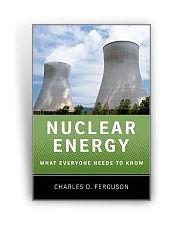|
||
• wydawnictwa polskie
• Zamów informacje o nowościach z wybranego tematu • kontakt
• Cookies na stronie |
NUCLEAR ENERGY: WHAT EVERYONE NEEDS TO KNOWFERGUSON C.D.wydawnictwo: OXFORD UP , rok wydania 2011, wydanie Icena netto:
Originally perceived as a cheap and plentiful source of power, the commercial use of
nuclear energy has been controversial for decades. Worries about the dangers that nuclear
plants and their radioactive waste posed to nearby communities grew over time, and plant
construction in the United States virtually died after the early 1980s. The 1986 disaster
at Chernobyl only reinforced nuclear power's negative image. Recent years have seen a
marked change, however. The alarming acceleration of global warming due to the burning of
fossil fuels and concern about dependence on foreign fuel has led policymakers, climate
scientists, and energy experts to look once again at nuclear power as a source of energy. What is the origin of nuclear energy? What countries use commercial nuclear power, and how much electricity do they obtain from it? How can future nuclear power plants be made safer? What can countries do to protect their nuclear facilities from military attacks? How hazardous is radioactive waste? Is nuclear energy a renewable energy source? Ferguson addresses these questions and more in a book that is essential for anyone looking to learn more about this important issue. Readership: General readers and scholars interested in nuclear energy, international affairs, politics, sustainable energy, nuclear proliferation, and environmental studies. Charles D. Ferguson is President of the Federation of American Scientists and an Adjunct Professor in Georgetown University's Security Studies Program. Trained as a physicist and nuclear engineer, he has worked on nuclear policy issues at the U.S. Department of State and the Council on Foreign Relations. Table of Contents Preface 232 pages, Paperback Księgarnia nie działa. Nie odpowiadamy na pytania i nie realizujemy zamówien. Do odwolania !. |


